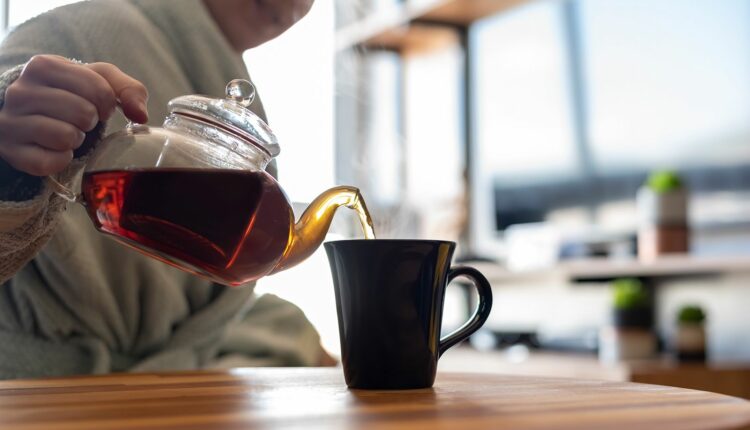©2021 Reporters Post24. All Rights Reserved.
Tea is one of the world’s most popular drinks, second only to water, and for good reason. This nutritional powerhouse is celebrated for its calming effects, bold flavors, and impressive health benefits.
“Tea is calorie-free and very rich in antioxidants,” says Whitney Linsenmeyer, a registered dietitian and spokesperson for the Academy of Nutrition and Dietetics.
These properties help lower the risk of stroke, improve blood pressure and cholesterol levels, and boost immune function. In fact, a 2022 study found that regular tea drinkers had a nine-13 percent lower risk of death over a decade compared to non-drinkers.
So, what makes a simple cup of tea so powerful? Here’s what happens to your body when you drink it.

How tea helps with focus and stress relief
Drinking tea can be an effective pick-me-up, thanks to its combination of caffeine and L-theanine, which improves alertness without the jitters associated with coffee, says Jennie Norton, a registered dietitian at RET Physical Therapy. Unlike a cup of joe, caffeine from tea is absorbed more slowly, providing steady energy for a more extended period of time.
Meanwhile, L-theanine, a non-protein amino acid found almost exclusively in tea, promotes relaxation and enhances cognitive performance. Numerous studies show that L-theanine, enhances concentration, improves memory retention, helps with stress, and may protect against chronic diseases.
“It also gives you a little bit of umami,” a savory flavor that enhances the taste of food, says Quan Vuong, a nutrition researcher at the University of Newcastle, Australia.
Matcha tea, in particular, is rich in L-theanine, with ceremonial-grade varieties offering the highest concentrations due to their shade-growing process. In comparison, herbal teas, which are made using a mixture of different herbs and spices, provide caffeine-free alternatives rich in antioxidants. For example, rooibos, a South African herbal tea, is rich in aspalathin, a flavonoid that may help regulate blood sugar.
In addition to L-theanine, tea contains small amounts of the neurotransmitter GABA (gamma-aminobutyric acid), which may enhance its calming effects and help reduce anxiety.
Beyond its chemical composition, tea’s warmth and aroma engage the senses in ways that further support mental clarity and relaxation. Studies suggest that the sensory experiences when drinking tea can help lower cortisol levels, reduce anxiety, and enhance mindfulness.
For example, a 2018 study found that inhaling black tea aroma reduced stress markers in participants performing cognitive tasks. Floral teas, like chamomile, are particularly effective for relaxation, while the refreshing scent of peppermint tea is linked to improved alertness.
Is tea good for hydration?
One of tea’s simplest yet most essential health benefits is hydration, says Emma Beckett, a nutrition researcher at the University of Newcastle, Australia. Staying hydrated helps your heart and muscles work more efficiently, lubricates the joints, helps with digestion, and boosts cognitive function.
(Here‘s what you actually need to hydrate.)
Although tea is a diuretic, due to the caffeine, the effect is mild, allowing it to remain a net positive. “Hydration isn’t just about what stays in your body,” Beckett says. “Hydration is about [water] moving through your body, and in moving through your body, that gives your body an opportunity to remove toxins and balance salts.”
Tea’s disease-fighting compounds
Tea is a rich source of antioxidants, particularly flavonoids like catechins. These combat cellular damage, reduce inflammation and potentially lower the risk of chronic diseases such as heart disease and certain cancers. Green tea stands out for its high catechin content, making it a potent source of anti-inflammatory and anti-cancer properties.
(Are these coffee alternatives worth the hype?)
With its high catechin levels, green tea is particularly prized for its anti-inflammatory and anti-cancer properties. The four main catechins in green tea are epicatechin, epigallocatechin, epicatechin gallate, and epigallocatechin gallate (EGCG), which work together to deliver these benefits. EGCG, in particular, has also been shown in preliminary studies to help regulate blood sugar levels, reduce abdominal fat, and enhance fat oxidation during exercise, making it a favorite among health enthusiasts.
While green tea contains the highest concentration of catechins, black tea retains antioxidant properties despite undergoing fermentation that reduces catechin levels, says Vuong. This process creates unique compounds like theaflavins and thearubigins, which contribute to black tea’s health benefits.
Emerging research suggests that tea’s antioxidants may play a role in supporting gut microbiome health by encouraging the growth of beneficial bacteria, which can impact everything from digestion to immune function.
These findings underscore the importance of consuming tea as a whole, where its compounds interact synergistically for maximum health benefits.
“People have tried to replicate the different compounds, individually, that are found in tea,” says Julie Stefanski, a registered dietitian and spokesperson for the Academy of Nutrition and Dietetics. However, as Stefanski notes, isolating specific compounds from tea never quite has the same benefit as drinking a cup due to the complexity of the different compounds found in tea. “They act together,” Stefanski says.


